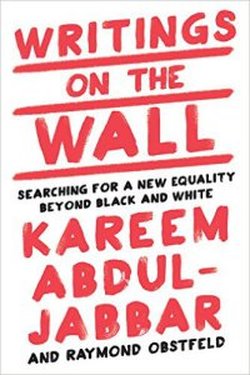
The album title is certainly appropriate for Abdul-Jabbar’s social examination of American mores and values, too. It is certainly a book worth talking about.
In Writings on the Wall: Searching for a New Equality Beyond Black and White (Liberty Street; hardback; $27.95; 245 pages) Abdul-Jabbar wants the reader to stop and think. It doesn’t matter what your political leanings might be; some will agree wholeheartedly with the NBA’s all-time scoring leader, and others are just likely to disagree with Abdul-Jabbar’s conclusions. But that’s not the point.
In Writings on the Wall, Abdul-Jabbar not only gives his own opinions — which are unabashedly liberal — he also is willing to listen to other points of view.
Ah yes, listen. What a novel idea. One can listen and still disagree.
Abdul-Jabbar, assisted by perennial co-author Raymond Obstfeld (who has co-written five books with Kareem) writes about sports of course, but also about race, gender and religion. He backs up his opinions with surveys, research, scholarly works and political polls. It’s almost like reading a college term paper; one is waiting for the footnotes at the bottom of the page. That speaks to Abdul-Jabbar’s thorough approach.
When he attended UCLA in the late 1960s, Abdul-Jabbar — still known by his birth name of Lew Alcindor — became a history major. He said he wanted to know why every culture “participated in some form of socially acceptable madness.” That included enslaving people, treating women like property and raining physical abuse on children.
“History was like a series of mass hypnosis events in which society was basically a large cult,” he writes.”
That love of history — and particularly his desire to present a more well-rounded look at black history — inspired him to write Black Profiles in Courage, Brothers in Arms, What Color is My World? and On the Shoulders of Giants.
He is 69 now, and Adbul-Jabbar remains active, He was a cultural ambassador for the United States, appointed by then-Secretary of State Hillary Clinton. He now writes columns and other opinion pieces for the Washington Post, Time and the Huffington Post. In an August 30 column for the Washington Post, Abdul-Jabbar addressed Colin Kaepernick’s decision to sit during the national anthem as a protest against racism. He wrote that “one of the ironies of the way some people express their patriotism is to brag about our freedoms, especially freedom of speech, but then brand as unpatriotic those who exercise this freedom to express dissatisfaction with the government’s record in upholding the Constitution.”
The main thrust of Writing on the Wall is that people have to do more critical thinking, no matter what their political leanings might be. He asserts that it’s a process that should begin with children in elementary school.
“They must be taught to question every premise, no matter who offers it,” Abdul-Jabbar writes.
Liberals are not exempt from criticism. Of President Barack Obama’s suggestion to make voting mandatory, Abdul-Jabbar calls it a bad idea.
“We shouldn’t have to persuade people to vote. They should see it as their joyful right and sacred responsibility,” he writes. “When we pressure people to vote, we’re diluting the democratic process by bringing out those who are easily manipulated because they lack any sense of social commitment.”
And in terms of racism, Abdul-Jabbar advances the theory that there are two kinds — explicit and implicit. Explicit includes bullying, shaming and offensive language; Abdul-Jabbar compares implicit racism to wallpaper — something in the background, but it’s there, “creating an undeniable tone and mood.”
Adbul-Jabbar’s approach to age and mortality is to compare senior citizens to “lottery winners with millions’ worth of experience, figuring out how best to spread the riches.” He refuses to accept the view that his generation should be viewed “like rusty old cars with leaking oil” and “screeching brakes.”
Abdul-Jabbar cautions against relying on social media, saying the public’s obsession with it “needs to be tempered.” He concedes the merits of sites like Facebook and Twitter as publicity vehicles; after all, his articles and books gain tremendous exposure when posted or tweeted on those sites. He argues that blurring the line between social media and social science is misleading.
“It’s no substitute for professional opinion polling, statistical research and just plain reporting,” he writes. “It’s like forecasting the weather based on a swollen bunion.”
He ends the book with an unsolicited letter to America’s Youth.
“Each generation must customize the American dream to fit its own circumstances and the realities of the surrounding world,” he writes. “Much of this book has been an indictment of those who preach the gospel of the American dream while secretly doing everything they can to pervert it.”
He urges adhering to the Constitution, particularly the parts that “condemn racism, sexism, homophobia and the exploitation of the poor.”
It’s something to think about. And critical thinking and opening dialogue is what Abdul-Jabbar is trying to achieve. So whether you find his ideas in Writings on the Wall enlightening or repugnant, critical thinking is what is important. And if people from all points of the political, social and economic spectrum can do that, then there is a chance for real progress.
And then the writing will truly be on the wall — a version of American graffiti that promises a positive step.
 RSS Feed
RSS Feed
